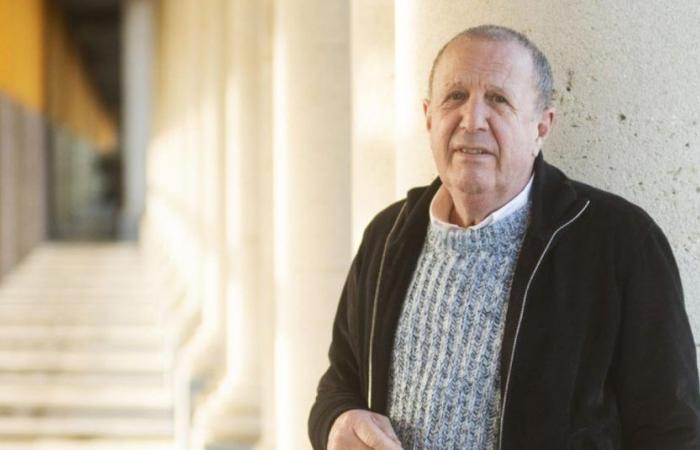Kurt Van Eeghem is concerned about the VRT. He watches with sorrow what is happening in the institution he loves so much. ‘Frederik Delaplace is in the hands of politicians.’
“I have never felt as much fear as today at the public broadcaster,” says Kurt Van Eeghem. The presenter closed the door behind him on Reyerslaan six years ago, but today he is more concerned than ever about the broadcaster and its survival. The immediate cause is the news that the VRT with Clever Heads is working on a program that was almost commissioned by the cabinet of Prime Minister Jan Jambon (NV-A). Other Flemish ministers are also encouraging the VRT to deliver programs in exchange for money.
But there have been storm clouds hanging over the broadcasting tower for some time now. A mediator was recently appointed to try to massage away all frustrations about the way in which CEO Frederik Delaplace managed the broadcast of The Process That Nobody Wanted about Bart De Pauw.
Knappe Koppen should become a program about Flemish science and innovation. It would come about under the direct management of Jan Jambon’s cabinet.
Kurt Van Eeghem: If I may just put it this way: hasn’t that been ripped off? I am very concerned about what is happening with the VRT, that is why I am speaking out. Resources have been very limited for years, also compared to other public broadcasters in Europe. Financially, the VRT is being quietly strangled by the same people who have a bait ready when programs they have in mind are made.
My beloved institute will then turn into a state broadcaster, just like they have in Poland and Hungary.
In the past, politicians only had influence through the management agreement, but now they make themselves heard much more often. This happens in a house where the employees are very anxious. People have been coming there for years at random dismissed. These are never the bosses, of whom there are still far too many, but always employees who often did very good work. At Klara I have already seen people leave and no one understood why they had to leave.
In the meantime, good people are also leaving VRT because they no longer want to work in that climate of fear. That stifles all creativity, while the VRT used to be known as an excellent employer where everyone could speak freely.
Courageously downwards with Kurt Van Eeghem: ‘It’s as if everything of value has to be destroyed’
Isn’t it always the case that politicians try to at least put some emphasis on what the VRT does?
Van Eeghem: That’s right. In the past, politicians sometimes made their wishes known, but not as shamelessly as today. I am anxious for the elections, because today is only the beginning of what can happen later. The party that will most likely become the largest in Flanders – I like to pronounce it very correctly a – states in its program that the VRT is an institution that must do what politicians say.
Taking money with one hand and then holding it out with the other: that is how fear is created in totalitarian societies.
I can’t help but wonder whether there will still be a public, pluralistic and independent broadcaster. My beloved institute will then turn into a state broadcaster, just like they have in Poland and Hungary. I’m exaggerating, but taking money with one hand and then holding it out with the other is how fear is created in totalitarian societies.
To be clear: today there are still many excellent programs being made on the VRT.
Van Eeghem: But of course. I say all this with an incredible amount of love. That’s why it touches me so deeply. In many countries, a channel like Canvas is still envied. Due to the savings, Klara has now become a hobby project, but I have a lot of respect for what my former colleagues achieved there with virtually no money.
The VRT found itself in a storm a few weeks ago when it turned out that Frederik Delaplace stopped the broadcast of The Trial That Nobody Wou about Bart De Pauw. What did you think of that?
Van Eeghem: These are all expressions of that culture of fear: watch out, be careful, don’t do it, pay attention, duck, etc. and so on. Delaplace is in the hands of politicians. No, he eats from the hands of politicians. He is not a leader who wants to fight for the projects that should be at the core of public broadcasting.
Delaplace is not a leader who wants to fight for the projects that should form the core of public broadcasting.
Ultimately, Delaplace was reprimanded by media minister Benjamin Dalle (CD&V) for his decision about The Trial That Nobody Wanted. He will probably even have to answer to parliament soon.
Van Eeghem: He’s tipsy game. He no longer knows how to behave, and there are other characters walking around at VRT.
Decades ago, the grip of politics on broadcasting was much greater. Employees have always had to be very careful.
Van Eeghem: Careful, yes. But I have never seen the fear that exists now. In the past, everyone who worked permanently at the VRT was set in stone. It was the opposite: those people were sometimes there for forty years and you couldn’t get them out with a stick, nothing or no one. Currently everyone is afraid for their job, and no one dares to say anything. In the past, there were very different journalists at the VRT who sometimes contradicted each other radically. That was funny. Today, the culture of fear is even beginning to creep around the news service, which should be an independent place par excellence.
Isn’t Bart De Pauw gradually – just in the meantime – entitled to a second chance in the media world?
Van Eeghem: He has made nothing but mistakes since he released that first, stupid video about the case in 2017. He completely ruined it for himself by not showing any insight into his guilt for a very long time. On the other hand, he is a guy with an incredible amount of talent, it is a shame that nothing more is done with him. I think he has really suffered enough and deserves to live and work again.
Today, the culture of fear is even beginning to creep around the news service, which should be an independent place par excellence.
The VRT often causes controversy these days. But sometimes other media need very little to attack the broadcaster. The media landscape is always hostile territory.
Van Eeghem: Of course. We must be aware of that. There is a media concentration in Flanders that Silvio Berlusconi has never been able to achieve. In addition to a stronghold in Roeselare, there are only two major media groups: DPG and Mediahuis. They have everything in their hands. If Christian Van Thillo and Thomas Leysen decide over a good glass of wine in a restaurant in Geneva that Peter Casteels will become Prime Minister of Belgium, you will be sure of that after the elections. They just have nothing to say about the VRT. That stings. The VRT also has money to make popular programs and does not have to let Dash and Alpro speak every fifteen minutes. VRT 1 is still by far the most watched channel in the viewing figures. Of course they want to reduce those channels.
Finally: Lydia Peeters, as mobility minister, also requested and received a program on cycling. Who can be against that?
Van Eeghem: That woman has the most wonderful inspirations, that is conscience. But if I ever have an idea for a program myself, I will indeed have to get on a political party’s list to get it implemented. (laughs)
Kurt Van Eeghem about Ostend in the Belle Époque: ‘It will never be this decadent again’
Tags: Kurt Van Eeghem independent VRT
-





